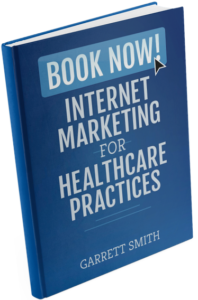Google is in the business of providing information, which attracts an audience, and provides businesses with opportunity to be in front of that audience.
I won’t get into the gory details, but suffice to say when a searcher (perhaps a potential patient) types something (an injury) into a search engine, the results that they receive are based on a complex algorithm.
The data the algorithm collects, models, and displays is based on a variety of factors, and among other things some mind blowing math.
Online citations are one factor, which we’ll talk about here today.
What is an Online Citation?

We’re not talking about the citations required for a scientific journal or research paper.
We’re not talking about traffic tickets.
We’re not talking politics, where presidential candidates whimsically make arguments without being able to provide a reliable citation for their remarks. 😛
We’re talking about Online Citations! Citations are any profile of you and your clinic that contains your Name, Address and Phone number (NAP).
Citations can take the shape of social profiles, like Facebook, health directories like Healthgrades or obscure sites like Kudzu, that you may have never even heard of before.
Managing, monitoring, claiming and verifying online citations are a significant component of a sound digital marketing campaign. It’s also a PITA! (Keep reading to learn more below!).
Why Should I care?
Claiming online citations requires a lot of effort.
Some of the rules for getting in Google’s good graces are written and some unwritten, this requires a lot of effort, Google rewards you for your work and understanding by favoring your business in the search rankings.
Google’s search algorithm assumes that deliberate efforts to get a searcher’s attention is something only a credible and capable business is likely to do, which is in lock step with what Google wants to provide with their search results.
Other than the rankings, and ensuring your practice is held in the same high-esteem online as it is offline, citations are where patients end their search to find information about your practice!
According to the PewResearchCenter 2013 study, 72% of searchers looked for health information online. This trend has grown rapidly in the past 3 years, with more and more people connected to the internet, better search engines, and better websites, all of which provide more information than ever before.
- Patients start out with a search engine (typically Google) and nearly 90% of them click on the top 3 “local” (Google Map) results, and the top 3 “organic” (below the map) results. If you have an effective digital marketing strategy your practice or practitioners should be listed twice: Once in the local rankings, and once in the top 3 spots of organic rankings.
No business, medical or not, as of the September 2016 ‘Possum’ update can be listed more than twice anywhere on the first page of Google.
- Patients then review the search results, and hopefully are finding your practice website in an effort to determine whether or not you could provide services to potentially treat their condition.
- Tip: make it easy for them to find your website by optimizing for treatments you provide and conditions that you treat.
- Patients then usually look at one or two of the citation directories that are also hopefully listing your practice to help them compare you to other providers, or to cement their decision that you are the right fit.
- Tip: The more complete the profile (ex. Listing physicians specialities, providing lots of pictures of the office / staff) the more weight Google gives it, and the better the experience is for the patient consuming the information.
‘So why would Google, bastion of the fastest and most accurate search results, endorse your profile on all of these 3rd party websites and directories?’

Two primary reasons:
- Google relies on citations to verify location data in their Google Maps product. The more sources of data they can pull from (and confirm), the less likely it is a user would get bad data and go to the wrong place. For Google to stay relevant and continue to dominate the search market, it’s imperative that they serve searchers the results they are looking for.
- Data from these websites is also used to power Google’s local pack search results (which we talked about in my Google Possum update post). Since Google wants to show businesses and search results from websites closest to the searcher in many cases, being able to verify a business or clinic’s location is important.
Also, Google knows that claiming, monitoring and managing these profiles is a painfully tedious task. Somewhere in the middle between the seriousness of Dante’s Inferno “Lasciate ogne speranza, voi ch’intrate” and a bugs bunny Devil’s Feud Cake.

It requires an exhaustive manual effort to consistently list your profile across 20 sites, let alone the top 50, or top 300, but taking this action is a strong indication to Google that you are making an effort (that can’t be faked) to help its search algorithm by supplying it with easy to understand and searchable data that patients are likely to favor when they find your practice’s website in search results. You help them, they help you, nice and neat.
- Because managing your online citations involve a lot of manual work (for example answering a phone call to verify a ‘new account created’ code), it makes it very difficult to automate.
- Because it is difficult to automate, it’s difficult to “game the system” (manipulating Google’s search results) to artificially increase the rank of your website and physician profiles, and therefore potentially mislead searchers to websites not deemed as ‘the most appropriate’ by Google’s search algorithm.
It’s not Google’s fault but …
This is further complicated because Google will change the value of a website, and the citation it has over time, new websites sites, and directories pop-up every month, while existing ones will need to be proactively maintained.
When updates occur many of these citation websites (in an effort to maintain good standing with Google), change what data can or is displayed, often resulting in some of the data being removed or misplaced, forcing you to re-enter information and to be vigilant in monitoring them.
(Not to mention the fact that A LOT of these websites are designed with the intention to trap you into connecting with them: so they can sell you their services, so you click on one of their ads, so they have an excuse to call you 5x a week for 3 weeks until you answer, until you finally give-in and listen to them pitch services that you don’t need.
If you’re not used to these types of websites, the process, or are not organized, you will be pulling your hair out in frustration just to simply submit your profile data for the second, or third time, or until you just give up.)
Sounds, fun right? Actually, its a PITA!
As mind-numbing as I knew the experience was going to be, I went through the process of manually finding, claiming, and verifying the top 50 citations for an orthopedic client last month.
With only the assistance of a spreadsheet and a few years worth of knowledge, I valiantly went from online profile, to directory listing to what I think was a social network to document just how hairy the process would be for practices trying to “do it yourself.”
For those not familiar with exactly what the process is: This took approximately 25 hours over a 3 week period to get our client’s practice name, address, and phone number (yes...NAP) listed on 50 websites. And I knew what I was doing! I was organized!

You read that right, literally just copy-pasting information into 50 different websites couldn’t be more painful.
However agonizing, it’s an important indicator to Google that your website should be provided and ranked highly in search results. Therefore claiming these is a critical factor to a sound online marketing strategy.
You’ll also need to take into consideration which 50 websites are the most important.
Something that is impossible without a lot of experience or some software. Google and other search engines prioritize websites by assigning a value to the authority and trustworthiness of a website called “domain authority” (DA).
It gets worse, of course…
I’ll give brief overview of what I went through. Sparing an exact recount of the details, from a high level, there were three things that slowed me down the most during this exercise.
- Inferior, and poorly constructed websites leading to errors. Making searching for the practice information on the sites using Google, and through the search function on the sites themselves very tedious.
- Inconsistent verification process (some websites took 2-3 weeks to verify the profile, others were instant, some required manual phone or text verification, some not).
- Fixing NAP issues on existing citations efforts from previous SEO companies or Doctors/Staff and discovering unknown email addresses and missing log-in information that had previously claimed the account.
Even though I had the huge advantage of being able to prioritize the top 50 citations by DA score (because of experience) this was still an exhausting effort!

Something needs to be done, but not something you want to do …
Thankfully, my boss doesn’t force me to do these citations manually for our clients. Done correctly with good software and a careful practice marketer claiming and maintaining of your profile across all of these websites provides a significant boost to your search rankings. Because of that, developing a strategy and maintaining a budget should be a priority for practices that are looking to increase traffic to their websites and increase practice revenue by helping prospective patients more easily find your practice online.

At InboundMD we’ve been obsessed with finding the best methods to help our clients with citations for years. We are as concerned with our own ROI as we are with yours, so we take very seriously the responsibility to provide you with the most efficient methods to getting your website ranked, including building, claiming, and monitoring the many hundreds of these profiles throughout the internet. We use sophisticated software to monitor and manage existing profiles and use our experience and efficiencies to accurately build new (thorough) profiles while avoiding expensive mistakes (and removing many headaches) that have the singular goal of quickly returning our client’s investment.
We can help! Shameless plug completely aside, Please don’t go through this painful experience yourself. Be smart with your time and your money. If you’re looking to take on just one single project for digital marketing this year, this is a great place to start. We have solutions to efficiently claim, optimize, and monitor up to 400 citation websites using our platform. If you have any doubt, please feel free to get in touch with me and I’ll send you a list of the top 5 citation websites and you can see for yourself!





